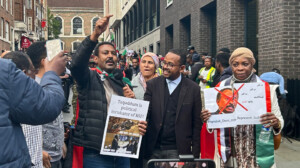Sudan commemorates the June 3 Massacre
Today, Sudan commemorates the June 3 Massacre, also known as the Ramadan 29 Massacre, for the second year in a row. The Public Prosecution assigned ‘high level’ protection for the march scheduled for today.
 The June 3 Massacre commemoration march today (social media)
The June 3 Massacre commemoration march today (social media)
Today, Sudan commemorates the June 3 Massacre, also known as the Ramadan 29 Massacre, for the second year in a row. The Public Prosecution assigned ‘high level’ protection for the march scheduled for today.

Vigil for the missing after the June 3 Massacre
on August 6, 2019 (RD)
On June 3, 2019, two days before the end of Ramadan, the large sit-in in front of the army command, was broken up with excessive violence. More than 127 protesters were reportedly killed. The bodies of 40 of them were found floating in the Nile. More than 700 others sustained injuries, and at least 100 people went missing in the June 3/Ramadan 29 massacre.
The sit-in was the result of the military coup. Since December 2018, large protests were organised to pressure the then ruling Omar Al Bashir to step down. In April, the dictator was deposed in a military coup. However, protesters continued to occupy the space in front of the Ministry of Defence to demand the military to cede power to a civilian government.
Two months later, on June 3/Ramadan 29, the people at the sit-in were attacked by government forces.
The 59-page report entitled “They Were Shouting ‘Kill Them’’: Sudan’s Violent Crackdown on Protesters in Khartoum documents the attacks by Sudanese security forces on protesters on June 3 and in days following in other neighbourhoods of the capital and neighbouring Bahri and Omdurman, where at least protesters were killed.
PM Hamdok statement
Sudan’s Prime Minister Abdallah Hamdok issued a statement yesterday in which he described the violent dispersal of the sit-in as “a criminal event committed by treacherous hands”.
"The June 3 Massacre is a wound that will not heal unless justice is achieved and criminals are brought to justice"
He further said that the massacre is “a wound that will not heal unless justice is achieved and criminals are brought to justice”.
The prime minister also pointed to the repeated incidents of assault on activists and resistance, especially during the years of dictatorship, and stressed that his government is determined to work hard to reveal the details of these assaults.
Hamdok stressed that ‘justice’ remains one of the major slogans of the December Revolution and affirmed his determination to achieve justice for the “victims of brutal repression and mass killing in Darfur, the Nuba Mountains, the Blue Nile state, northern and eastern Sudan, and every part of Sudan in which the former regime has perpetrated its evil and criminality”.
Attorney General
Acting Attorney General El Waleed Mahmoud Osman also held a press briefing yesterday in which he stressed that the right to organise protest marches and peaceful demonstrations is guaranteed under the Constitutional Document.
He also indicated that the Public Prosecution has assigned ‘high level’ protection for the protest march scheduled for today.
The acting attorney general also revealed updates on the procedures of several martyr’s lawsuits. He indicated that a committee was formed regarding the violent dispersal of the sit-in commemoration in May, and that the committee had made great steps in terms of, interrogating the accused, mapping the scene of the accident, and gathering evidence.

May 11 protests
On May 11, a peaceful sit-in to commemorate the massacre was dispersed by authorities with excessive violence, killing two people and wounding over 37. The events sparked public outrage.
The Communist Party of Sudan demanded the resignation of the members of the government and called the event "a crime committed in cold blood, previously agreed on, for which the military and civilian sides in the government and the governor of Khartoum bear full responsibility”.
At the time, The Sudan Armed Forces (SAF) responded that “no instructions were issued to the forces protecting the army command to use live ammunition against the people” and that “what happened will be subject to investigation”.

Investigation results
Upon request of PM Hamdok, an independent national commission of inquiry into the June 3 massacre was formed in September 2019. Headed by prominent lawyer and human rights defender Nabil Adeeb, the commission began collecting testimonies, photos, and video recordings of more than 3,000 witnesses and has started the in-person questioning of the military members of the Sovereignty Council.
Many Sudanese have been wondering why the commission has not been able to round up its report and publish any results yet.
“The result could lead to a coup d’état or to mass unrest in the streets"
“The result could lead to a coup d’état or to mass unrest in the streets,” the human rights defender replied in an interview on May 4. He attributed the delay of the investigation to the unrealistic deadline he was given to mount a task this large.











 and then
and then